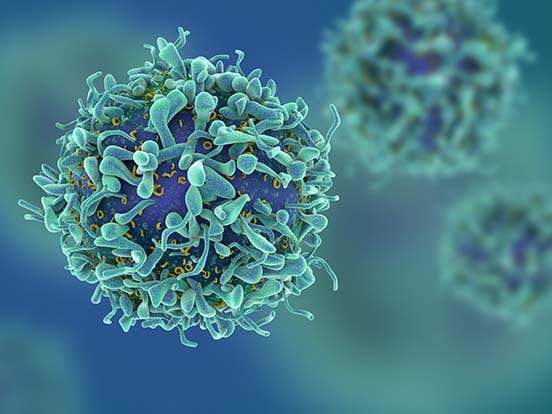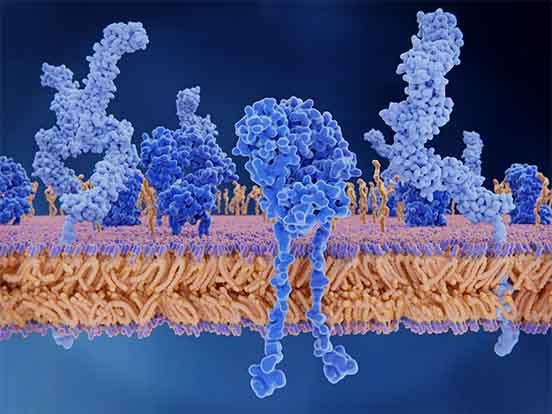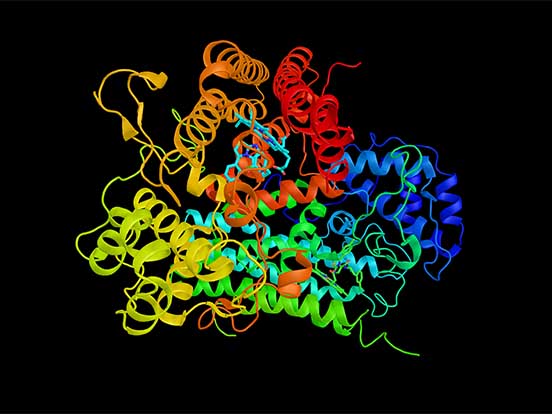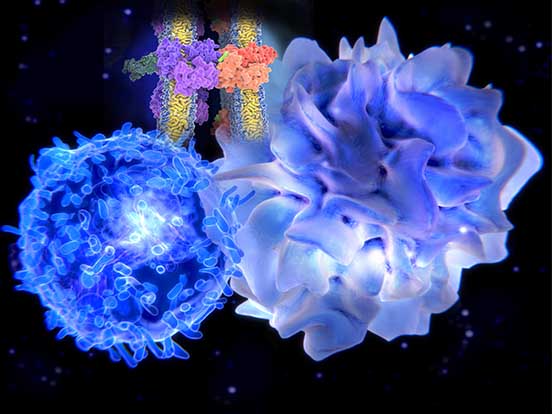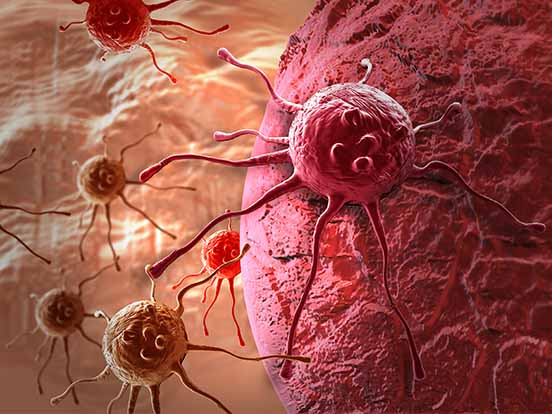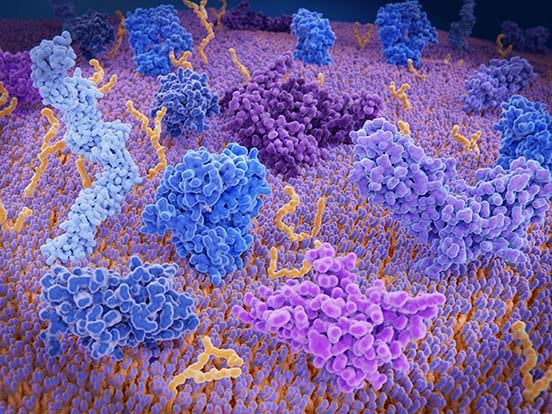
Immunotherapy
Proteins, cell lines and assay kits for your immunology research
Immunotherapy is defined as the treatment of disease by inducing, enhancing, or suppressing an immune response. Given its diverse function and the fact that the immune system plays a role in virtually all human diseases, immunotherapy has become an important approach for the treatment of numerous diseases.
This often involves targeting immunoreceptors with small molecule inhibitors/activators or immune system components including antibodies or antibody fragments (Fab). Immunotherapies have shown efficacy in the treatment of cancer, autoimmune diseases, inflammatory diseases, and more, and are an exciting avenue of immunology research.
Our Products
AMSBIO offers many purified, soluble immunoreceptors involved in key immunosignaling pathways. Additionally, we offer a number of assay kits that can be used to screen for inhibitors of protein-protein interaction, as well as neutralizing antibodies to serve as positive controls for inhibition.
| Name | Datasheet | Packsize | Order |
|---|---|---|---|
| Anti-CD20 Functional Antibody | - | 100 ug | View |
| Anti-CTLA4 Neutralizing Antibody | 100 ug | View | |
| Anti-PD-1 Neutralizing Antibody | - | 100 ug | View |
| Anti-PD-1 Neutralizing Antibody|Biotin-labeled | - | 100 ug | View |
| Anti-PD-L1 (CD274) Neutralizing Antibody | - | 100 ug | View |
| Anti-PD-L1 Neutralizing Antibody|Biotin-Labeled | - | 100 ug | View |
| Name | Datasheet | Packsize | Order |
|---|---|---|---|
| BAFF:BCMA[Biotinylated] Inhibitor Screening Assay Kit | - | 96 reactions | View |
| BCMA:APRIL[Biotinylated] Inhibitor Screening Assay Kit | - | 96 reactions | View |
| BTLA:HVEM[Biotinylated] Inhibitor Screening Assay Kit | - | 96 reactions | View |
| CD112R:CD112[Biotinylated] Inhibitor Screening Assay Kit | - | 96 reactions | View |
| CD137[Biotinylated]:CD137L Inhibitor Screening Assay Kit | - | 96 reactions | View |
| CD226:CD112 Homogeneous Assay Kit | - | 384 reactions | View |
| CD226:CD155 Homogeneous Assay Kit | - | 384 reactions | View |
| CD27:CD70[Biotinylated] Inhibitor Screening Assay Kit | - | 96 reactions | View |
| CD28:B7-1[Biotinylated] Inhibitor Screening Assay Kit | - | 96 reactions | View |
| CD28:B7-2[Biotinylated] Inhibitor Screening Assay Kit | - | 96 reactions | View |
| CD38 (Mouse) Inhibitor Screening Assay Kit (Hydrolase Activity) | - | 96 reactions | View |
| CD38 (Rat) Inhibitor Screening Assay Kit (Hydrolase Activity) | - | 96 reactions | View |
| CD38 Inhibitor Screening Assay Kit (Cyclase Activity) | - | 96 reactions | View |
| CD38 Inhibitor Screening Assay Kit (Hydrolase Activity) | - | 384 reactions | View |
| CD38 Inhibitor Screening Assay Kit (Hydrolase Activity) | - | 96 reactions | View |
| CD39 Inhibitor Screening Assay Kit | - | 96 reactions | View |
| CD40:CD40L TR-FRET Assay | - | 384 reactions | View |
| CD40:CD40L[Biotinylated] Inhibitor Screening Assay Kit | - | 96 reactions | View |
| CD47:SIRP-?[Biotinylated] Inhibitor Screening Assay Kit | - | 96 reactions | View |
| CD70|His-Tag (Mouse) Recombinant | - | 100 ug | View |
| CD73 Inhibitor Screening Assay Kit | - | 384 reactions | View |
| CD73 Inhibitor Screening Assay Kit | - | 96 reactions | View |
| CTLA4 : B7-2[Biotinylated] Inhibitor Screening Assay Kit | - | 96 reactions | View |
| CTLA4:B7-1 TR-FRET Assay Kit | - | 384 reactions | View |
| CTLA4:B7-1[Biotinylated] Inhibitor Screening Assay Kit | - | 96 reactions | View |
| CTLA4[Biotinylated]:B7-2 Inhibitor Screening Assay Kit | 96 reactions | View | |
| FGL1:LAG3 TR-FRET Assay Kit | - | 384 reactions | View |
| FGL1:LAG3 TR-FRET Assay Kit | - | 96 reactions | View |
| GITR:GITRL TR-FRET Assay Kit | - | 384 reactions | View |
| GITRL:GITR[Biotinylated] Inhibitor Screening Assay Kit | - | 96 reactions | View |
| ICOSL:ICOS[Biotinylated] Inhibitor Screening Assay Kit | - | 96 reactions | View |
| IDO1 Assay Buffer | - | 1 ml | View |
| IDO1 Fluorogenic Inhibitor Screening Assay Kit -384 | - | 384 reactions | View |
| IDO1 Fluorogenic Inhibitor Screening Assay Kit | - | 96 reactions | View |
| IDO1 Fluorogenic Reaction Solution | - | 10 ml | View |
| IDO1 Inhibitor Mechanism of Action Assay Kit | - | 50 reactions | View |
| IDO1 Inhibitor Screening Assay Kit -384 | - | 384 reactions | View |
| IDO1 Inhibitor Screening Assay Kit | - | 96 reactions | View |
| IDO1 Reaction Solution | - | 10 ml | View |
| IDO2 Assay Buffer | - | 1 ml | View |
| IDO2 Inhibitor Screening Assay Kit | - | 96 reactions | View |
| IDO2 Reaction Solution | - | 10 ml | View |
| IL-17RA[Biotin]:IL-17A Inhibitor Screening Assay Kit | - | 96 reactions | View |
| KMO Inhibitor Screening Assay Kit | - | 384 reactions | View |
| KMO Inhibitor Screening Assay Kit | - | 96 reactions | View |
| Kynureninase Inhibitor Screening Assay Kit | - | 100 reactions | View |
| LAG3:FGL1[Biotinylated] Inhibitor Screening Assay Kit | - | 96 reactions | View |
| LIGHT:HVEM [Biotinylated] Inhibitor Screening Assay Kit | - | 96 reactions | View |
| LT?R:LIGHT[Biotinylated] Inhibitor Screening Assay Kit | - | 96 reactions | View |
| Mouse CTLA4:B7-1 TR-FRET Assay | - | 384 reactions | View |
| Mouse CTLA4[Biotin]:B7-1 Inhibitor Screening Assay Kit | - | 96 reactions | View |
| Mouse IDO1 Inhibitor Screening Assay Kit | - | 96 reactions | View |
| Mouse IDO2 Inhibitor Screening Assay Kit | - | 96 reactions | View |
| Mouse PD-1[Biotinylated]:PD-L1 Inhibitor Screening Assay Kit | - | 96 reactions | View |
| NeutrAvidinâ„¢ Plates | - | 1 plate | View |
| NeutrAvidinâ„¢ Plates | - | 5 plates | View |
| OX40[Biotinylated]:OX40L Inhibitor Screening Assay Kit | - | 96 reactions | View |
| PD-1:PD-L1 Cell-Based Inhibitor Screening Assay Kit | - | 96 reactions | View |
| PD-1:PD-L1 Homogeneous Assay Kit | - | 384 reactions | View |
| PD-1:PD-L1 TR-FRET Assay | - | 384 reactions | View |
| PD-1:PD-L1 TR-FRET Assay | 96 reactions | View | |
| PD-1:PD-L1[Biotinylated] Inhibitor Screening Assay Kit | - | 96 reactions | View |
| PD-1:PD-L1[Biotinylated] Inhibitor Screening Colorimetric Assay Kit | - | 96 reactions | View |
| PD-1:PD-L2 Cell-Based Inhibitor Screening Assay Kit | - | 96 reactions | View |
| PD-1:PD-L2 Homogeneous Assay Kit | - | 384 reactions | View |
| PD-1:PD-L2 TR-FRET Assay Kit | - | 384 reactions | View |
| PD-1:PD-L2[Biotinylated] Inhibitor Screening Assay Kit | - | 96 reactions | View |
| PD-1:PD-L2[Biotinylated] Inhibitor Screening Colorimetric Assay Kit | - | 96 reactions | View |
| PD-1[Biotinylated]: PD-L1 Inhibitor Screening Assay Kit | - | 384 reactions | View |
| PD-1[Biotinylated]:PD-L1 Homogeneous Assay Kit | - | 384 reactions | View |
| PD-1[Biotinylated]:PD-L1 Inhibitor Screening Assay Kit | - | 96 reactions | View |
| PD-1[Biotinylated]:PD-L1 Inhibitor Screening Colorimetric Assay Kit | - | 96 reactions | View |
| PD-1[Biotinylated]:PD-L2 Inhibitor Screening Assay Kit | - | 96 reactions | View |
| PD-1[Biotinylated]:PD-L2 Inhibitor Screening Colorimetric Assay Kit | - | 96 reactions | View |
| PD-L1 (Woodchuck) / TCR Activator Mammalian Expression Kit | - | 500 reactions | View |
| PD-L1:B7-1 [Biotinylated] Inhibitor Screening Assay Kit (Mouse) | - | 96 reactions | View |
| PD-L1:B7-1[Biotinylated] Inhibitor Screening Assay Kit | - | 96 reactions | View |
| RANK:RANKL TR-FRET Assay | - | 384 reactions | View |
| RANK:RANKL TR-FRET Assay | - | 96 reactions | View |
| TDO Assay Buffer | - | 1 ml | View |
| TDO Fluorogenic Inhibitor Screening Assay Kit -384 (Human) | - | 384 reactions | View |
| TDO Fluorogenic Inhibitor Screening Assay Kit (Human) | - | 96 reactions | View |
| TDO Fluorogenic Reaction Solution | - | 10 ml | View |
| TDO Inhibitor Screening Assay Kit -384 | - | 384 reactions | View |
| TDO Inhibitor Screening Assay Kit | - | 96 reactions | View |
| TDO Reaction Solution | - | 10 ml | View |
| TIGIT:CD112 Homogeneous Assay Kit | - | 384 reactions | View |
| TIGIT:CD155 Homogeneous Assay Kit | - | 384 reactions | View |
| TNFR2:TNF-alpha[Biotinylated] Inhibitor Screening Assay Kit | - | 96 reactions | View |
| TPH1 Inhibitor Screening Assay Kit | - | 384 reactions | View |
| TPH1 Inhibitor Screening Assay Kit | - | 96 reactions | View |
| TPH2 Inhibitor Screening Assay Kit | - | 384 reactions | View |
| TPH2 Inhibitor Screening Assay Kit | - | 96 reactions | View |
| Universal IDO1/IDO2/TDO Inhibitor Screening Assay Kit | - | 150 reactions | View |
| VSIG-3:VISTA [Biotinylated] Inhibitor Screening Assay Kit | - | 96 reactions | View |
| Name | Datasheet | Packsize | Order |
|---|---|---|---|
| ADCC Bioassay Effector Cell (Mouse) Jurkat Cell Line | - | 2 vials | View |
| ADCC Bioassay Effector Cell F Variant (Low Affinity)/ NFAT Luciferase Reporter Jurkat Cell Line | - | 2 vials | View |
| ADCC Bioassay Effector Cell V Variant (High Affinity)/ NFAT Luciferase Reporter Jurkat Cell Line | - | 2 vials | View |
| ADCP Bioassay Effector Cell Fc?RIIa (H variant) /NFAT Reporter-Jurkat | - | 2 vials | View |
| AP1 Reporter Kit (JNK Pathway) | - | 500 reactions | View |
| ARE Reporter Kit (Nrf2 Antioxidant Pathway ) | - | 500 reactions | View |
| Adenosine A2A Receptor Functional HEK293 Cell Line | - | 2 vials | View |
| BCMA CHO Recombinant Cell Line (High Expression) | - | 2 vials | View |
| BCMA CHO Recombinant Cell Line (Low Expression) | - | 2 vials | View |
| CD137 (4-1BB) /NF-kappaB Reporter - HEK293 Recombinant Cell Line | - | 2 vials | View |
| CD137 (4-1BB) HEK293 Recombinant Cell Line | - | 2 vials | View |
| CD137L (4-1BBL) CHO-K1 Recombinant Cell Line | - | 2 vials | View |
| CD155 (PVR) - HEK293 Recombinant Cell Line | - | 2 vials | View |
| CD155 / TCR Activator - CHO Recombinant Cell line | - | 2 vials | View |
| CD160/NFAT - Luciferase Reporter - Jurkat Recombinant Cell Line | - | 2 vials | View |
| CD19 CHO Recombinant Cell Line (High Expression) | - | 2 vials | View |
| CD19 CHO Recombinant Cell Line (Low Expression) | - | 2 vials | View |
| CD19 CHO Recombinant Cell Line (Medium Expression) | - | 2 vials | View |
| CD22 CHO Recombinant Cell Line (High Expression) | - | 2 vials | View |
| CD22 CHO Recombinant Cell Line (Medium Expression) | - | 2 vials | View |
| CD27 CHO-K1 Stable Recombinant Cell Line | - | 2 vials | View |
| CD27/NF-kB Reporter-Jurkat Recombinant Cell Line | - | 2 vials | View |
| CD4+ T cells/ Negatively Selected (Human) | - | 10 million cells | View |
| CD40 - HEK293 Cell Line | - | 2 vials | View |
| CD40/NF-kappaB Luciferase Reporter HEK293 Cell Line | - | 2 vials | View |
| CD47 - HEK293 Cell Line | - | 2 vials | View |
| CD70-CHO Recombinant Cell line | - | 2 vials | View |
| CD8+ T cells/ Negatively Selected (Human) | - | 10 million cells | View |
| CRE/CREB Reporter Kit (cAMP/PKA Signaling Pathway) | - | 500 reactions | View |
| CTLA4 / IL-2 Reporter - Jurkat Recombinant Cell Line | - | 2 vials | View |
| FOXO Reporter Kit (PI3K/AKT Pathway) | - | 500 reactions | View |
| FcGR2B CHO K1 Recombinant Cell Line | - | 2 vials | View |
| Foxp3 Luciferase Reporter Jurkat Cell Line | - | 2 vials | View |
| GAL4 Reporter Kit (Glucocorticoid Receptor Pathway) | - | 500 reactions | View |
| GITR / NF-kappaB Luciferase Reporter - Jurkat Cell Line | - | 2 vials | View |
| GITR - HEK293 Recombinant Cell Line | - | 2 vials | View |
| GITRL CHO-K1 Recombinant Cell Line | - | 2 vials | View |
| Growth Arrested PD-1 / NFAT Reporter Jurkat Cell Line | - | 2 vials | View |
| HVEM - CHO Recombinant Cell Line | - | 2 vials | View |
| HVEM - HEK293 Recombinant Cell Line | - | 2 vials | View |
| HVEM/NF-kappaB Reporter Jurkat Recombinant Cell Line | - | 2 vials | View |
| ICOSL-CHO Recombinant Cell Line | - | 2 vials | View |
| IDO1 Cell-Based Assay Kit | - | 100 reactions | View |
| IDO1 Cellular Activity QuickDetectâ„¢ Supplements | - | 100 reactions | View |
| IDO1 Cellular Activity QuickDetectâ„¢ Supplements | - | 1000 reactions | View |
| IDO1-HEK293 Recombinant Cell Line (Human) | - | 2 vials | View |
| IDO2 - HEK293 Recombinant Cell Line (Human) | - | 2 vials | View |
| IDO2 Cellular Activity QuickDetectâ„¢ Supplements | - | 100 reactions | View |
| IDO2 Cellular Activity QuickDetectâ„¢ Supplements | - | 1000 reactions | View |
| IL-2 Luciferase Reporter Jurkat Cell Line | - | 2 vials | View |
| LAG3 / NFAT Reporter - Jurkat Recombinant Cell Line | - | 2 vials | View |
| LIGHT-CHO Recombinant Cell Line | - | 2 vials | View |
| LILRB4 NFAT-Luciferase Reporter Jurkat Recombinant Cell Line | - | 2 vials | View |
| Mouse Notch1 Pathway Reporter Kit (Notch Signaling Pathway) | - | 500 reactions | View |
| Mouse PD-L1 / TCR Activator Mammalian Expression Kit | - | 500 reactions | View |
| Myc Reporter Kit (Myc Signaling Pathway) | - | 500 reactions | View |
| NF-kappaB Luciferase Reporter A549 Cell Line | - | 2 vials | View |
| NF-kappaB Luciferase Reporter Jurkat Cell Line | - | 2 vials | View |
| NFAT Luciferase Reporter Jurkat Cell Line | - | 2 vials | View |
| OX40 - HEK293 Recombinant Cell Line | - | 2 vials | View |
| OX40 / NF-kappaB Reporter - HEK293 Recombinant Cell Line | - | 2 vials | View |
| PAI-1 Reporter (Luc) - Mv1 Lu Cell Line | - | 2 vials | View |
| PD-1 (Mouse) / NFAT - Reporter - Jurkat Recombinant Cell Line | - | 2 vials | View |
| PD-1 (Woodchuck) / NFAT - Reporter - Jurkat Recombinant Cell Line | - | 2 vials | View |
| PD-1 - HEK293 Recombinant Cell Line | - | 2 vials | View |
| PD-1 / NFAT Reporter - Jurkat Recombinant Cell Line | - | 2 vials | View |
| PD-1:PD-L1/PD-L2 Cell-Based Inhibitor Screening Assay Kit | - | 96 reactions | View |
| PD-L1 (Mouse) / TCR Activator - CHO Cell Line | - | 2 vials | View |
| PD-L1 (Woodchuck) / TCR activator - CHO Recombinant Cell line | - | 2 vials | View |
| PD-L1 - CHO Recombinant Cell Line | - | 2 vials | View |
| PD-L1 / TCR Activator - CHO Recombinant Cell Line | - | 2 vials | View |
| PD-L1 / TCR Activator Mammalian Expression Kit | - | 500 reactions | View |
| PD-L2 / TCR activator - CHO Recombinant Cell Line | - | 2 vials | View |
| PD-L2/TCR Activator Mammalian Expression Kit | - | 500 reactions | View |
| SBE Reporter Kit (TGF?/SMAD signaling pathway) | - | 500 reactions | View |
| SIRP-alpha / HEK293 Recombinant Cell Line | - | 2 vials | View |
| SRE Reporter Kit (MAPK/ERK Signaling Pathway ) | - | 500 reactions | View |
| TCF/LEF Reporter Kit (Wnt Signaling Pathway) | - | 500 reactions | View |
| TCR Activator Raji Cell Line | - | 2 vials | View |
| TDO Cell-Based Assay Kit | 100 reactions | View | |
| TDO Cellular Activity QuickDetectâ„¢ Supplements | - | 100 reactions | View |
| TDO Cellular Activity QuickDetectâ„¢ Supplements | - | 1000 reactions | View |
| TDO-HEK293 Recombinant Cell line | - | 2 vials | View |
| TIGIT - HEK293 Recombinant Cell Line | - | 2 vials | View |
| TIGIT / NFAT Reporter - Jurkat Cell Line | - | 2 vials | View |
| TLR9/NF-kappaB Reporter - HEK293 Recombinant Cell Line | - | 2 vials | View |
| Name | Packsize | Order |
|---|---|---|
| B7-1 (CD80), Fc fusion | 100 ug | View |
| B7-2 (CD86), Fc fusion | 100 ug | View |
| B7-H2 (CD275, ICOSL), Fc fusion | 100 ug | View |
| B7-H4, His-tag | 100 ug | View |
| BTLA(CD272), Fc fusion | 100 ug | View |
| CD112, His-tag | 100 ug | View |
| CD112, His-tag, Biotin-labeled | 50 ug | View |
| CD27, Fc fusion | 100 ug | View |
| CD28, Fc fusion | 200 ug | View |
| CD40L (CD154), His-tag | 100 ug | View |
| CD47, Fc fusion | 100 ug | View |
| CD47, His-tag | 100 ug | View |
| CD70, His-tag | 100 ug | View |
| GITR (CD357), Fc fusion | 100 ug | View |
| GITRL, His-tag | 100 ug | View |
| HVEM, Fc fusion | 100 ug | View |
| Human CD137 (4-1BB), Fc fusion | 100 ug | View |
| Human CD46-BC, His-tag | 100 ug | View |
| ICOS (CD278), Fc fusion | 100 ug | View |
| LAT, His-tag | 20 ug | View |
| Monkey (M. fascicularis) PD-1, Fc fusion | 100 ug | View |
| Monkey (M. fascicularis) PD-L1, Fc fusion | 100 ug | View |
| Monkey (M. fascicularis) PD-L1, Fc fusion, Biotin-labeled | 50 ug | View |
| Monkey CD46-BC, His-tag | 100 ug | View |
| Monkey CD46-C, His-tag | 100 ug | View |
| Mouse CD155 (PVR), His-tag | 100 ug | View |
| OX40 (CD134), Fc fusion | 100 ug | View |
| OX40L (CD252), His-tag | 100 ug | View |
| PD-L1 (F19A), Fc fusion, Biotin-labeled | 50 ug | View |
| PD-L2 (CD273), Fc fusion (Human) | 100 ug | View |
| PD-L2 (CD273), Fc fusion, Biotin-labeled (Human) | 50 ug | View |
| TDO, His-tag (Human) | 50 ug | View |
| TIM-3, Biotin-labeled, His-tag | 50 ug | View |
| TPH1, His-tag | 50 ug | View |
| TPH2, His-tag | 50 ug | View |
| Name | Packsize | Order |
|---|---|---|
| Anti-PD-1 Neutralizing Antibody|PE-labeled | 100 ug | View |
| Anti-PD-1 Neutralizing Antibody|PE-labeled | 50 ug | View |
| Anti-PD-L1 Antibody|PE-labeled | 100 ug | View |
| Anti-PD-L1 Antibody|PE-labeled | 50 ug | View |
| Mouse PD-1, Fc fusion, PE-labeled | 50 ug | View |
| Mouse PD-L1, Fc fusion, PE-labeled | 50 ug | View |
| PD-L1 (Human), Fc Fusion (Mouse IgG2a) PE-Labeled | 50 ug | View |
The Immune System
The immune system is a system of cells and organs whose function is to defend an organism from foreign pathogens. With the ability to mount a response against virtually any foreign material and return to a quiescent state following neutralization of the threat, this fascinating organ system displays remarkable specificity and plasticity. To achieve this, there is a multifaceted balancing act between the many activators and suppressors that maintains homeostasis of perhaps the body’s most complex organ system.
Activation of the immune system involves a number of checkpoints in order to ensure proper activation. For instance, T cell activation requires binding of the T cell receptor to the MHC antigen, yet this interaction alone is not sufficient for producing a T cell response. Full T cell activation and inactivation requires the coordination of a multitude of co-stimulatory and inhibitory signals. For example, T cell activation can result from the combination of MHC:TCR and B7-1:CD28 interaction. In contrast, B7-1 binding to CTLA4 results in an inhibitory signal that prevents activation.
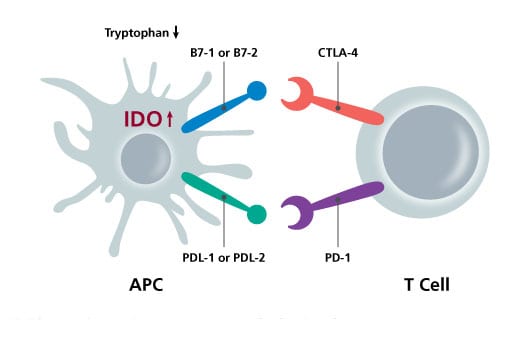
Given its diverse function and the fact that the immune system plays a role in virtually all human diseases, immunotherapy has become an important approach for the treatment of numerous diseases. Immunotherapy is defined as the treatment of disease by inducing, enhancing, or suppressing an immune response. This often involves targeting immunoreceptors, such as those discussed above, with small molecule inhibitors/activators or immune system components, including antibodies or antibody fragments (Fab). Immunotherapies have shown efficacy in the treatment of cancer, autoimmune diseases, inflammatory diseases, and more.
PD-1 Receptor
The understanding of the checkpoint signaling pathway involving the programmed death 1 (PD-1) receptor and its ligands (PD-L1/2) in tumor-induced immune suppression has been a critical advancement in immunotherapeutic drug development. Tumors that express PD-L1 can often be aggressive and carry a poor prognosis. The anti-PD-1 and anti-PD-L1 agents have a good safety profile and have resulted in durable responses in a variety of cancers, including melanoma, kidney cancer, and lung cancer. The PD-1/PD-L1 pathway in cancer is implicated in tumors escaping immune destruction and is a promising therapeutic target. The development of anti-PD-1 and anti-PD-L1 agents marks a new era in the treatment of cancer with immunotherapies.
References
The blockade of immune checkpoints in cancer immunotherapy
Pardoll, D.M., Nat. Rev. Cancer. 2012; 12: 252-264.
Cancer immunotherapy – revisited
Lesterhuis, W.J., et al., Nat. Rev. Drug. Disc. 2011; 10: 591-600.
